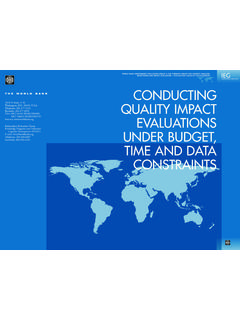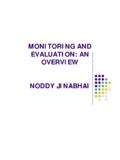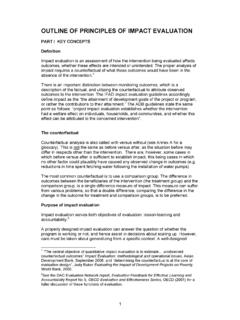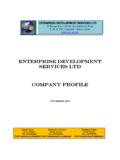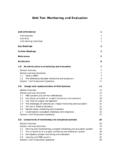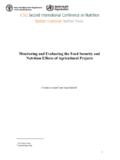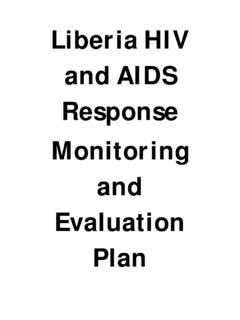Transcription of Learning Lessons with Knowledge Audits - OECD.org
1 Learning Lessons with Knowledge Audits Olivier Serrat Senior evaluation Specialist ( Knowledge Management) Operations evaluation Division 1 Operations evaluation Department Presented at the Malaysian evaluation Society s Third International evaluation Conference Kuala Lumpur, Malaysia 31 March to 4 April 2008 CONTENTS ABSTRACT ii I. INTRODUCTION 1 II. Learning Lessons IN ADB 1 III. AUDITING THE Lessons ARCHITECTURE 7 IV. CONCLUSION 15 BIBLIOGRAPHY/REFERENCES 17 ABSTRACT The Asian development bank (ADB) has committed to become a Learning organization. But the use of evaluation for Learning may be less important than that of other inputs, such as self- evaluation and training, and evaluation results may only marginally support policy, strategy, and operational changes.
2 In 2006, concerned about the small number of downloads of its evaluation reports through the Internet, a corollary of user interest in a world driven by information technology, the Operations evaluation Department in ADB determined to apply Knowledge management to lesson Learning . In 2007, it formulated a strategic framework to improve the organizational culture, management system, business processes, information technology solutions, community of practice, and external relations and networking for that. The framework holds promise not only in the department but, more importantly, vis- -vis its interfaces with other departments in ADB, developing member countries of ADB, and the international evaluation community. It sets the stage for regular annual Knowledge Audits for systematic identification and analysis of Knowledge needs, products and services, flows, uses, users, and gaps from the perspective of Learning Lessons .
3 It also permits formulation of annual business plans to deliver outputs steadily against each interface. This paper explains the strategic framework. It also describes the Knowledge audit methodology developed in 2007 to tie in with the department's audiences. The online, questionnaire-based survey of perceptions conducted as a first exercise that year provided ready and multiple entry points against which the department can take measures to that intent, as well as a comprehensive baseline assessment against which to judge progress. Fundamentally, the paper contends that evaluation agencies should move from "make-and-sell," at the simplest level, to "sense-and-respond" in ways that are increasingly satisfying to stakeholders. Knowledge from evaluations will not be used effectively if the specific organizational context, Knowledge , and relationships of evaluation agencies, and the external environment they face, are not dealt with in an integrated and coherent manner.
4 Knowledge management can shed light on possible operating frameworks for this and Knowledge management initiatives can be applied to catalyze and facilitate identification, creation, storage, sharing, and use of Lessons . That would be Knowledge utilization indeed. I. INTRODUCTION 1. In the Asian development bank (ADB), independent evaluations conducted by the Operations evaluation Department (OED) aim to provide effective feedback on performance to improve the relevance, effectiveness, efficiency, and sustainability of ongoing and future operations, and to enhance thereby contributions to the development of ADB's developing member Since 2004, OED reports to the Board of Directors of the bank rather than to its Management. Behavioral autonomy, avoidance of conflicts of interest, insulation from external influence, and organizational independence have advanced its mission to help ADB become a Learning organization that continuously improves its development effectiveness and is accountable to its stakeholders.
5 However, producing credible, timely, and objective data, information, and Knowledge that describe organizational performance is meaningful only if what is learned informs decision making. In 2006, concerned about the small number of downloads of its evaluation reports through the Internet, a corollary of user interest in a world driven by information technology, OED decided to promote Knowledge management to foster lesson Learning . Encouraged by positive feedback from other departments, and mindful of the need to increase value-added from operations evaluation , it then formulated plans for establishment of a Knowledge management unit in 2007 to catalyze and facilitate identification, creation, storage, sharing, and use of Lessons . With reference to Learning Lessons in ADB,2 which guides the Knowledge management initiatives of the department, this paper outlines the strategic framework for Knowledge management in operations evaluation in ADB and sketches the Knowledge management initiatives introduced in 2007 and to date.
6 Since even improved and well-used evaluation systems do not generate Learning automatically, the paper explains also how the department then moved to generate Learning through stakeholder involvement and via communication in a dynamic organizational context, and how regular Audits of ADB's Lessons architecture are expected to support that. The paper leans on Auditing the Lessons Architecture,3 which placed emphasis on meaning, management, and measurement to examine what helps or hinders the transfer of Knowledge through evaluation studies. The annual sovereign and nonsovereign lending volume of ADB is typically $6 billion,4 with technical assistance usually totaling about $180 million a year. Plausibly, the return on investment in lesson Learning for operational and developmental impact is likely to be high, and maximizing it is a legitimate concern.
7 II. Learning Lessons IN ADB A. Knowledge , Relationships, Context, and External Environment 2. Knowledge must not be seen as something that is supplied from one person to another, or from better-off countries to developing countries, but rather as something that can flow back and forth and be continually improved, adapted, and refreshed using Knowledge management tools. What is more, the latter are more effective where the specific Knowledge , relationships, and context of organizations and the external environment they face are dealt with in an integrated and coherent manner. Figure 1 demonstrates the importance of using Knowledge management tools with respect to the specific milieu in which ADB operates. The framework, 1 evaluation at ADB has two major dimensions: (i) self- evaluation by the units responsible for particular development interventions, and (ii) independent evaluation by OED.
8 Both are governed by principles of usefulness, credibility, and transparency. The second, as the name indicates, is made stronger by the additional principle of independence, and the associated attributes of impartiality and freedom from bias. This paper relates to independent evaluation . 2 ADB. 2007. Learning Lessons in ADB. Manila. Available: ADB. 2007. Auditing the Lessons Architecture. Manila. Available: This does not include cofinancing and the counterpart funds that the governments of developing member countries associate with ADB's operations, which amounted to about $ billion and $ billion, respectively, in 2006 for loans totaling a higher-than-average $ billion. 2 formulated by the Overseas development Institute to analyze and compare processes of change in a holistic manner, is applicable to other development agencies and, with small adjustments, to organizations in general.
9 Figure 1: A Holistic View of Knowledge and Knowledge Management Tools Organizational Context Strategic alignment, management processes, institutional pressures, funding cycles, historical evolution, etc. Inter- and Intra-Organizational Relationships Networks, information technology, communication plans, core functions, support functions, etc. Organizational Knowledge Identification, creation, storage, sharing, and use; forms and locations; key activities and tools; relevance; monitoring and evaluation , etc. External Environment Partners, donors, other development agencies; networks; national and global factors, etc. Source: Adapted from Ramalingam, Ben. 2005. Implementing Knowledge Strategies: Lessons from International development Agencies. Working Paper 244. Overseas development Institute. B. Audiences 3.
10 In ADB, OED conducts evaluations to find out what results are being achieved, what improvements should be considered, and what is being learned. It does so with systematic and impartial assessment of policies, strategies, programs, and projects, including their design, implementation, and results. Sharing lessons5 also demonstrates good governance and advances understanding of what ADB aims to accomplish, thereby generating support for it. Figure 2 illustrates the principal audiences for evaluations, using ADB as an example. 5 Lessons are of two types: operational and developmental. Operational Lessons relate, among others, to performance measurement, aid coordination, resource requirements, team building and coordination, procurement practices, delivery and reporting systems, and logistics.











